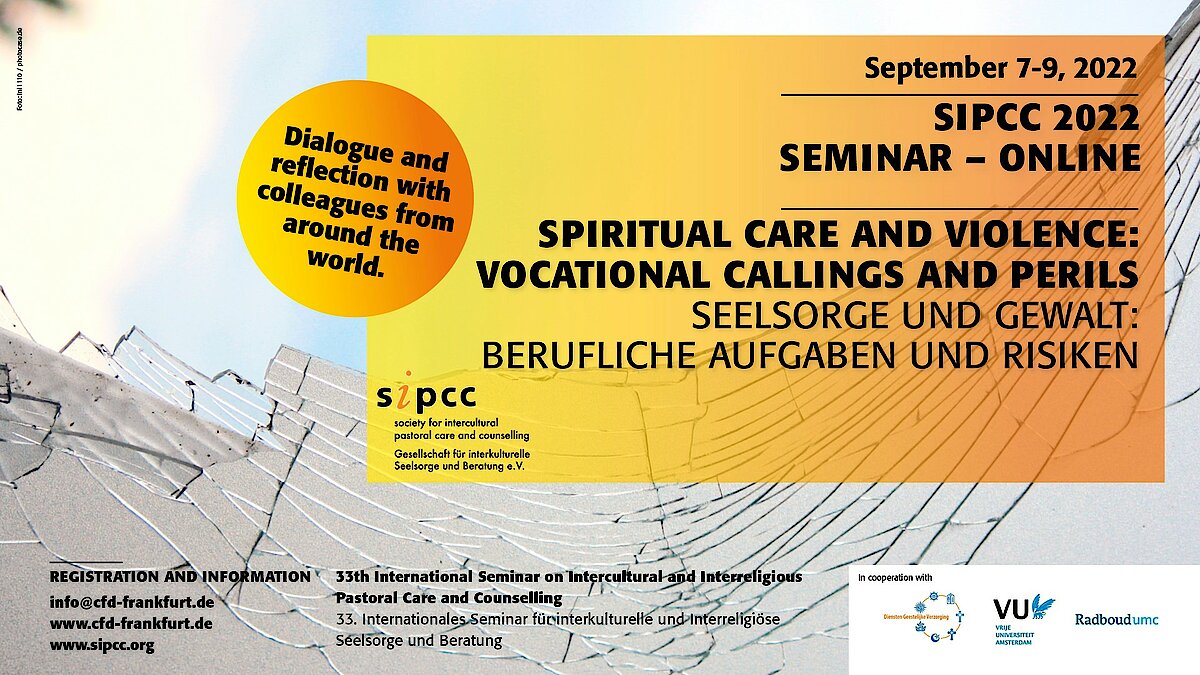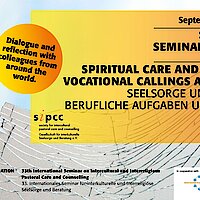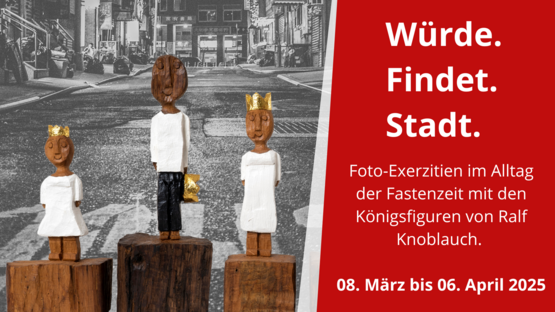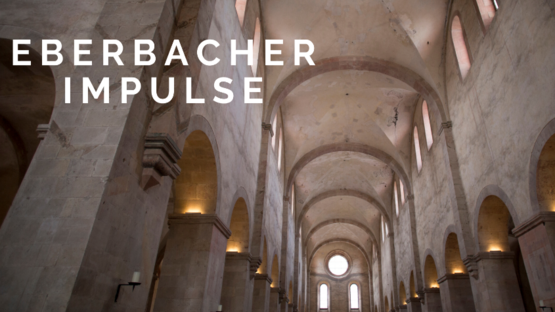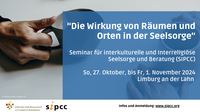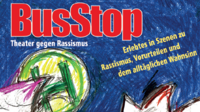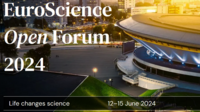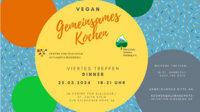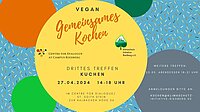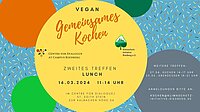SPIRITUAL CARE AND VIOLENCE: VOCATIONAL CALLINGS AND PERILS
SEELSORGE UND GEWALT: BERUFLICHE AUFGABEN UND RISIKEN
33th International Seminar on Intercultural and Interreligious Pastoral Care and Counselling
33. Internationales Seminar für interkulturelle und Interreligiöse Seelsorge und Beratung
Topics, issues and processes of the seminar
The relationship between religious traditions and violence is ambiguous. On the one hand, religious traditions oppose violence and strive to inspire people to love and peace. On the other hand, religious traditions have often inspired various forms of violence and even war. The practice of spiritual care, which is grounded in these worldviews and traditions, can frequently reflect this ambiguity and these are the aspects we hope to explore.
Spiritual care practices and moral injury
Our starting point will be the response of spiritual caregivers to violence. We will focus on spiritual care and moral injury as it is conceived by Jonathan Shay and presented by Pieter Vos, professor of military chaplaincy studies and associate professor of ethics at the Protestant Theological University Groningen/Amsterdam. Prof. Vos’s presentation will look at how these concepts and theories have become applicable not only to military
chaplaincy but in the health care profession over the last two years.
Workshops
In a variety of workshops on Thursday, we will further explore themes and practices related to spiritual care and violent situations from various professional, cultural and religious perspectives. These workshops will have a more practical, applied focus.
Unintended violence in intercultural spiritual care
Lastly, we will refl ect on some pitfalls and risks in intercultural and interreligious communication. It is not enough to reflect on violence as something outside ourselves or outside spiritual care, but it is also necessary to reflect on it as part of who we are and what we do, however inconvenient that might be. Marianne Moyaert, professor of comparative theology and hermeneutics of interreligious dialogue at the Vrije Universiteit Amsterdam, will lead us in Friday’s reflection.
Hope
We hope that our reflections on the multifaceted relationship between violence and spiritual care can help us follow our calling as spiritual caregivers in the ways we respond to both victims and perpetrators of violence while avoiding, as much as possible, the perils.
Working methods of SIPCC seminars
The working methods of the seminar are based on SIPCC’s self-perception as a network in which intercultural and interreligious pastoral and spiritual care practice, education and academic research, and teaching are interactively linked and mutually enrich each other. Practitioners, trainers and teachers in academic fields contributing to pastoral and spiritual care and counselling are invited to exchange ideas regarding holistic approaches to people’s well-being. Because SIPCC promotes interactive exchanges and learning, we seek to include as many opportunities for interaction as possible through break-out groups, reflection groups and workshops.
Lectures (Day 1 & 3)
The lectures will consider the topic of the day from a more academic or professional perspective in order to stimulate discussion. During the seminar, the speakers will present their lectures as interactively as possible. Their presentations will be interspersed with breakout room sessions where we will reflect on the lecture in small groups.
Reflection groups (Day 1 & 3)
Reflection groups are small groups (about 8 members) where we have a chance to meet and share on a more personal level. The reflection groups open up spaces for sharing experiences, opinions and ideas in a narrative, biographical way. The focus of these groups is not the academic or professional but rather on expressing oneself and sharing feelings or emotions the presentations may have generated. Participants will be in the same group during the whole seminar so that the conversation can be deepened.
(Given the online format, participants will also be the same in both the reflection and breakout groups to give people the best opportunity to get to know one another. The “rules of engagement” will differ for the two groups but moderators will be in each group to provide guidance.)
Workshops (Day 2)
Participants can choose two of the multiple workshops being offered. These approach the theme of violence and spiritual care from a variety of perspectives with presenters from different countries, cultures and religions. Workshops are designed to be hands-on and participatory with moderators accompanying the workshop.
Interviews: Sharing Experiences (Day 2)
Participants from different faith backgrounds and countries will share their experiences from Day 1 and 2 in the main room as an input and inspiration for further exchanges.
Devotions and Blessing (Day 1 & 3)
We close our days with a devotion or blessing, which are led by representatives of the various faiths and worldviews that make up our group.
SEMINAR PROGRAMME
All times are listed in CET (UTC +2).
If you have any questions about logging in or problems with connectivity, please e-mail Mr. Christoph Breitling (c.breitling@sankt-katharina-frankfurt.de), the technical moderator.
Wednesday, September 7, 2022 (Day one)
Topic of the day
MORAL INJURY AND SPIRITUAL CARE
14:00 h
Open space. The technical moderator will open the room for informal chats. You can request a breakout room for individual greetings once people begin arriving. However, if you know you want to meet with specific people, please email the technical moderator in advance; it helps expedite the process.
14:30 h
Technical moderator will provide a short informational session regarding Zoom and translation
14:40 h
Welcome – Opening of the SIPCC ONLINE SEMINAR
14:45 h
General introduction to the seminar
14:55 h Break
15:00 h
Introduction of Prof. Dr. Pieter Vos (Protestantse Theologische Universiteit, Groningen/Amsterdam)
15:05 h
Keynote lecture by Prof. Dr. Pieter Vos on “Moral Injury and Spiritual Care”. In order to make the seminar as interactive as possible, we will break into small discussion groups at intervals during the lecture.
16:55 h Break
17:00 h
Reflection groups (about 8 people)
17:40 h Break
17:45 h Devotion
17:55 h Closing – Day 1
18:00 h
The room will remain open until 18:30 for informal meetings and chats.
Thursday, September 8, 2022 (Day two)
Topic of the day
SPIRITUAL CARE AND VIOLENCE
14:00 h
Open space. The technical moderator will open the room for informal chats and individual breakout rooms.
14:30 h
Technical moderator will provide a short informational session regarding Zoom and translation.
14:35 h
Interviews – Impressions of Day 1
14:45 h
Welcome to Day 2 and instruction on workshops
14:50 h
Workshops I
Each participant is able to attend 2 workshops.
1. Dr. Wim Smeets : Healthcare, Covid and Moral Injury in a European/Dutch context
2. Dr. Josh Morris: Healthcare and Moral Injury in a North American CONTEXT
3. Chaplain KoSent: What to Do with Guilt?
4. Chaplain Julius Itumeleng Pudule: Violence in South-African Communities
5. Su Myat Htet: Report from Myanmar
6. Prof. Dr. Hans Alma and Dr. Gertie Blaauwendraad Compassionate Care
7. Manu Matthew: Gandhi and Non-Violence from an Indian perspective
8. Prof. Dr. George Varughese: Experiences of Coloniality from an Indian PERSPECTIVE
9. Prof. Dr. Mariecke van den Berg: Gender, Sexuality and Identity
10. Prof. Dr. Daniel Schipani, Rabbi Daniel A. Smith, Prof. Dr. Zehra Ersahin: Sacred Texts that Inform, Inspire, and Guide Us into Our Understanding and Practice of Care in the Face of Violence
11. Prof. George Varughese, Rev. Helmut Weiss, Rev. Frank Macht: Domestic Violence and Intercultural Care and Counselling
12. Aik Paung Seinn: Gender-Based Violence in Myanmar
13. Prof. Dr. Jessica Roitman and Chaplain Joram Rookmaker: Dealing with Conflicts within a Tradition
14. Džemal Šibljaković: Islamic Spiritual Care and Violence in Prison Systems
15:50 h Break
15:55 h Workshops II – (See list above)
16:50 h Break
16:55 h
Reflection groups (about 8 members)
17:35 h Devotion
17:45 h
Interviews – Impressions of Day 2
17:55 h Closing – Day 2
18:00 h
Room will remain open until 18:30 h for informal meetings and chats.
Friday, September 9, 2022 (Day three)
Topic of the day
VIOLENT ASPECTS OF INTERCULTURAL COMMUNICATION
14:00 h
Open space. Technical moderator will open the room for informal chats and individual breakout rooms.
14:30 h
Technical moderator will provide a short informational session regarding Zoom and translation
14:40 h
Welcome to Day 3
14:45 h
Introduction of Prof. Dr. Marianne Moyaert (Vrije Universiteit Amsterdam)
14:50 h
Keynote lecture – Prof. Dr. Marianne Moyaert on “Violent Aspects of Interfaith Communication”. In order to make the seminar as interactive as possible, we will break into small discussion groups at intervals during the lecture.
16:50 h Break
16:55 h
Reflection groups (about 8 people)
17:25 h
Synopsis, highlights and evaluation of the 2022 seminar
17:45 h
Closing speech
17:55 h Blessing
18:00 h
Room will remain open until 18:30 h for informal meetings and chats
TECHNICAL MODERATION AND SIMULTANEOUS TRANSLATION
TECHNICAL MODERATORS:
Christoph Breitling & Maurice Goldmann
TRANSLATORS:
Marta Brudny & Agnieszka Sababady.
The seminar is conducted in English and German.
Das Seminar findet in englischer und deutscher Sprache statt.
REGISTRATION / ANMELDUNG
Please send an email with the following information to:
Bitte schreiben Sie uns mit folgenden Informationen an: info@cfd-frankfurt.de
> Name, First name: / Name, Vorname:
> City / Stadt:
> Country / Land:
> Email:
> Two workshops of your choice: Nr. Nr. Nr.
Please list your top 3 workshop choices in order of preference.
This data will be added to our address database so that we can keep you updated about SIPCC and future events unless you expressly object when registering. We will only use this data internally and will not share it without your explicit permission.
Ihre Daten werden in unsere Adressdatenbank aufgenommen, damit wir Sie zu künftigen Veranstaltungen einladen können, es sei denn, Sie widersprechen bei der Anmeldung ausdrücklich. Wir verwenden diese Daten nur intern und geben sie nicht ohne Ihre ausdrückliche Zustimmung weiter.
DONATION FOR THE SEMINAR:
THE ONLINE SEMINAR IS FREE. However, SIPCC still incurs expenses (translation, technical support and preparation) so we ask all participants (as they are able) for a donation to support the seminar. A guideline is 50 Euro per person or more.
DONATION VIA BANK TRANSFER:
Beneficiary: Society for Intercultural Pastoral Care and Counselling
Friederike-Fliedner-Weg 72
40489 Düsseldorf, Germany
+49 211 479 0525 / +49 211 400894
NAME AND ADDRESS OF THE BANK:
KD-Bank für Kirche und Diakonie
Schwanenwall 27
44135 Dortmund, Germany
SWIFT CODE BIC GENODED1DKD
IBAN DE76 3506 0190 1012 0680 22
If you want to donate with Paypal / Mastercard / Visa / Sepa / Giropay, please go to the SIPCC website: www.sipcc.org.
If you need help, please send an e-mail to our treasurer, Alexander Letz: letz.sipcc@web.de
Dear Participants / Liebe Teilnehmer*in
Dear Participants:
The following information will not be stored but is designed to help us create discussion and reflections groups that mirror the rich diversity of SIPCC in ways that lead to enriching and thought-provoking conversations. We hope it is also a tool to help you start thinking about what you would like to share and to learn from the upcoming seminar.
Please send this completed questionnaire to Margret Noltensmeier, the SIPCC secretary, at: m.noltensmeier@t-online.de
--> Name:
--> Profession and areas of expertise: FAITH PRACTICE / WORLDVIEW – Which faith practice / life view / worldview do you feel most comfortable contributing from? Which has most influenced your perspective on violence?
--> Language and Culture: One of the simultaneous blessings and challenges of SIPCC is the diversity of languages, cultures and ways of speaking about our faith practices and the world around us. Culture shapes our way of understanding the world around us. Our use of language is what makes us human;
it is a means to share what is important to us but it can, sadly, also be a means to offend or hurt others (often unintentionally). We want to display respect for and awareness of linguistic and cultural diversity within the group while continuing to find ways to effectively “multilanguage.”
--> Which culture / part of the world would you like to represent? Or is most present within you?
--> What is your mother tongue / heritage language?
How comfortable are you in English?
- Understanding it
- Using it in a conversation
- Will you need translation from English into another language?
Liebe Teilnehmer*in:
Die folgenden Informationen werden nicht gespeichert, sondern sollen uns helfen, Diskussions- und Reflexionsgruppen zu bilden, die die reiche Vielfalt von SIPCC auf eine Weise widerspiegeln, die zu bereichernden und zum Nachdenken anregenden Gesprächen führt. Wir hoffen, dass dieser Fragebogen auch Ihnen dabei hilft, sich Gedanken darüber zu machen, was Sie mit anderen teilen möchten und was Sie von dem bevorstehenden Seminar lernen möchten.
Bitte senden Sie diesen Fragebogen ausgefüllt an Margret Noltensmeier, die SIPCCSekretärin, unter: m.noltensmeier@t-online.de
--> Ihr Name:
--> Beruf und Fachgebiet: GLAUBENSPRAXIS / WELTANSCHAUUNG – Aus welcher Glaubenspraxis / Lebensanschauung / Weltanschauung können Sie am ehesten einen Beitrag leisten? Welche hat Ihre Sichtweise von Gewalt am meisten beeinflusst?
--> Sprache und Kultur:
Einer der gleichzeitigen Segnungen und Herausforderungen von SIPCC ist die Vielfalt der Sprachen, Kulturen und Arten, über unsere Glaubenspraxis und die Welt um uns herum zu sprechen. Die Kultur prägt unsere Art, die Welt um uns herum zu verstehen. Unser Sprachgebrauch macht uns menschlich; er ist ein Mittel, um mitzuteilen, was uns wichtig ist, kann aber leider auch ein Mittel sein, um andere (oft unbeabsichtigt) zu beleidigen oder zu verletzen.
Wir wollen die sprachliche und kulturelle Vielfalt innerhalb der Gruppe respektieren und uns ihrer bewusst sein, während wir weiterhin Wege finden, um effektiv “mehrsprachig” zu sein.
--> Welche Kultur / welchen Teil der Welt würden Sie gerne repräsentieren? Oder ist sie in Ihnen am stärksten präsent?
--> Was ist Ihre Muttersprache / Ihre Heimatsprache?
--> Wie sicher fühlen Sie sich in der englischen Sprache?
- Es zu verstehen
- Es in einem Gespräch zu verwenden
- Werden Sie eine Übersetzung vom Englischen in eine andere Sprache benötigen?
